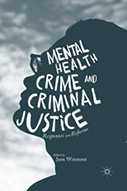MENTAL HEALTH, CRIME AND CRIMINAL JUSTICE: RESPONSES AND REFORMS

Editor: Jane Winstone
Publisher: Houndmills, Basingstoke, Hampshire, UK; New York: Palgrave Macmillan, 2016. 301p.
Reviewer: Kayla G. Jachimowski | January 2017
Mental Health, Crime and Criminal Justice (Winstone, 2016) is a refreshingly candid look at the challenges related to persons with mental illness(es). Through multiple perspectives, the book sheds light on the often overlooked and behind the scene issues that arise when mentally ill individuals commit crime. The book goes beyond the obvious problems individuals with mental illness face by delving into more obscure but important issues, thus giving the reader a deeper understanding of the material covered in each chapter. Every chapter contributes unique insight into the underlying theme of the book in such a way to indirectly prompt the reader to critically think about the relationship between mental health and crime and criminal justice.
The text begins with a brief overview and a philosophical discussion of whether individuals with mental illness should be punished. For example, chapter three, Troublesome Offenders, Undeserving Patients? develops both the argument that individuals with mental health needs have the right to be punished and the argument that they have the right not to be punished. The book progresses by explaining why it may be difficult for individuals with mental illness to break away from committing crime, the misleading portrayal of substance abuse when diagnosing mental health disorders, and the roles of service providers working in multiple environments relating to the mental health field.
The final chapters offer suggestions for strategies to improve the relationship between service providers and criminal justice agencies. Two of the most important chapters, 13 and 14, discuss the idea of a “complex multi-agency environment” where different agencies must successfully work together to improve the cohesiveness among liaisons, diversion services, and the criminal justice system. Although the reader is provided with optimistic recommendations for collaboration techniques, the authors recognize the difficulties in implementing such strategies. The book concludes by offering another philosophical and psychological discussion which examines the humanness of socio-cultural terms that surround an individual with mental illness — for example, “mentally disordered offender” or MOD.
The most appealing aspect of this book is its commitment to providing an all-encompassing view of how the mental health system and criminal justice relate to mentally disordered individuals, and how those individuals who suffer from a range of mental diagnoses are affected by the system’s deficits. Chapter two is especially powerful as Lucy, a person who suffers from multiple mental illnesses, begins by describing the mental health system as a resource that successfully improved her life. Upon her relapse years later, however, the same system aided in the regression of Lucy’s mental health, and limited her progress towards a healthier future. Through several mental health misdiagnoses and being forced to “self-admit” into a hospital, Lucy discusses the hardships of having a mental illness in a time where public budgets are being cut and priority is no longer given to treatments for individuals with mental diagnoses.
Overall, this book is exceptionally well-edited; topics and voices cohere especially well for an edited volume. The book is obviously technical, and geared towards either practitioners or scholars/students of criminal justice and mental health. Despite this, the book remains accessible to a wider audience, with descriptions of some seemingly unfamiliar ideas. Additionally, the book, while coming out of the United Kingdom, discusses ideas in a way that renders them applicable to other national contexts as well.
Kayla G. Jachimowski, Doctoral Student, Indiana University of Pennsylvania


